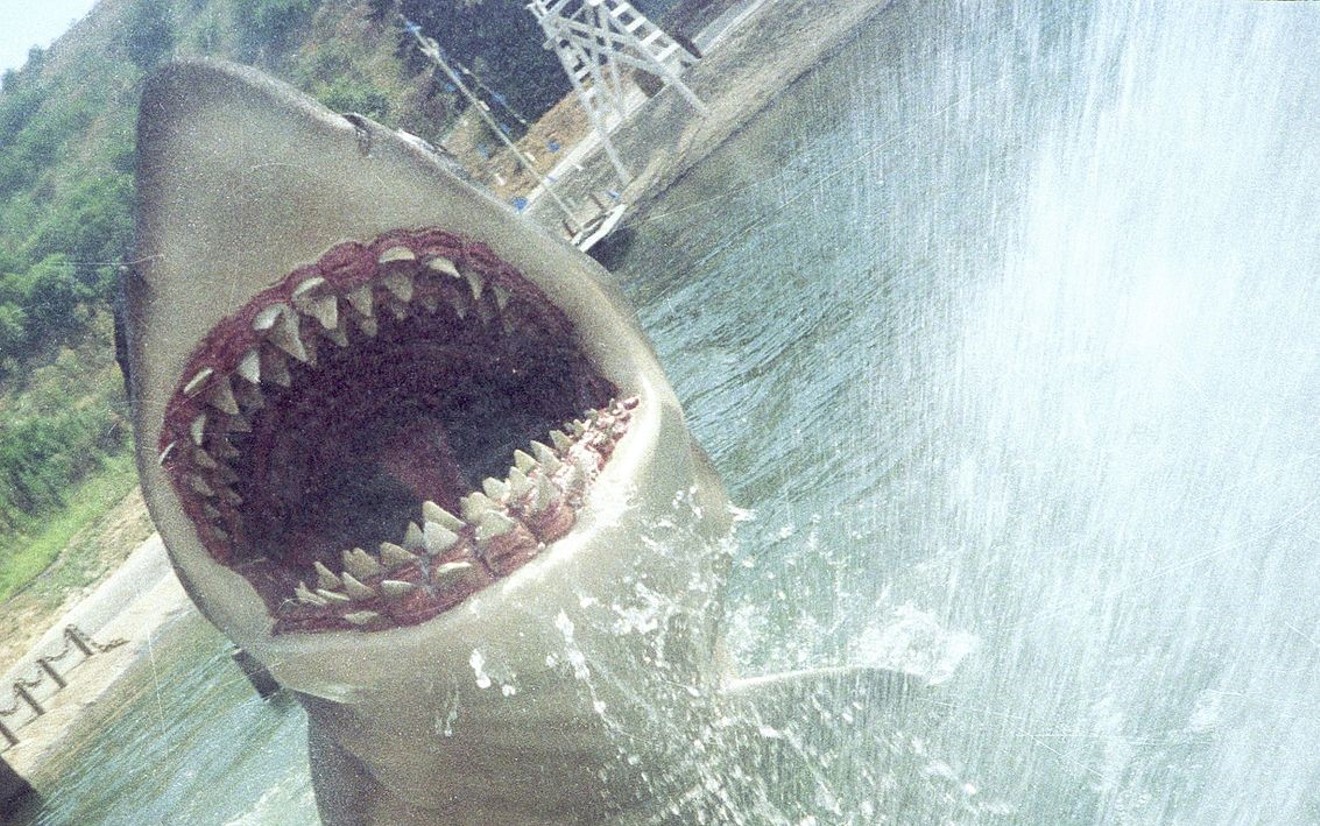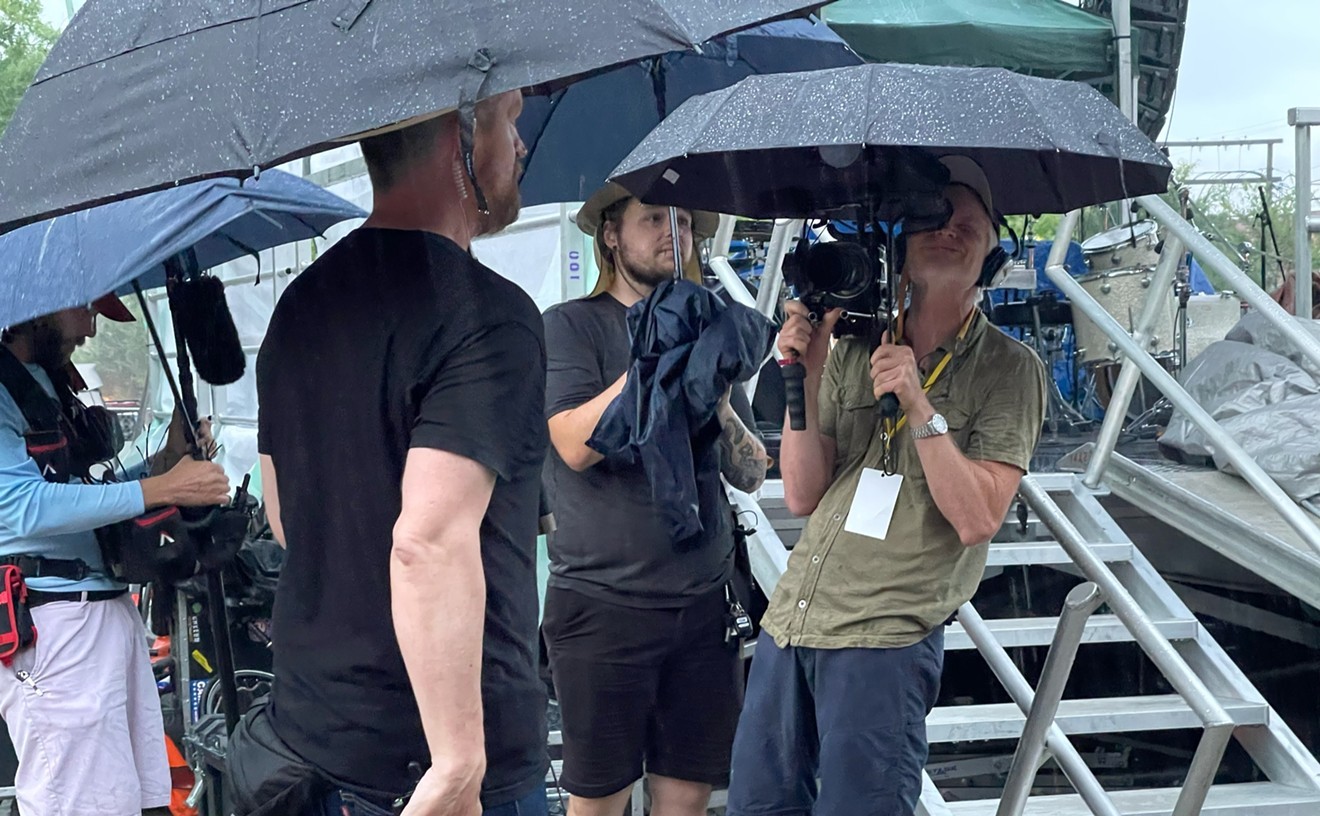The summer box office may not be booming like it once did, but it's still one of the most competitive times of the year for movies. And it's all because of Jaws.
Director Steven Spielberg's career-making horror film — about a man-eating great white shark that creates aquatic havoc in a small vacation town — created the summer blockbuster as we know it. But Spielberg wasn't sure that the film would even turn a profit once it was released. It took a screening at a Dallas movie theater to right the ship and give him the confidence to make Jaws the classic it would become.
A new book called Spielberg: The First Ten Years, by author and filmmaker Laurent Bouzereau, chronicles the decade of filmmaking that would turn Spielberg into one of the most important filmmakers of our time. Vanity Fair published an excerpt of the book that includes an interesting story about one of the first public screenings of Jaws for a public audience in Dallas that changed Spielberg's mind about how audiences might take to his first major blockbuster.
The story of Jaws' production is a legendary one because, like the film itself, it's a tale fraught with peril and uncertainty, starting with its mechanical star.
Spielberg established himself in television directing episodes of hit shows such as Columbo, Night Gallery and Marcus Welby M.D. In 1971, he moved into motion picture territory with the vehicular TV movie thriller Duel starring Dennis Weaver as an ordinary commuter who finds himself being pursued by a tractor-trailer who seems hellbent on turning him into a grease spot on the highway.
The film became so critically acclaimed and widely viewed that it helped Spielberg transition into his dream career as a film director, starting in 1974 with the crime thriller The Sugarland Express, starring Goldie Hawn. During the postproduction on the film, he learned about a new book from author Robert Benchley called Jaws, which, as he told Bouzereau, he "had no idea this would ... become one of the greatest best-sellers in the nation."
Benchley's Jaws hit the bookshelves in 1974 and became one of the year's and decade's biggest hits. So, naturally, studios tried to get Benchley to sign a deal for the film rights. He signed a pact with Universal Studios that would net him 10% of the film's profits, according to the The Washington Post.
Producers Richard Zanuck and David Brown won the rights and picked Spielberg to make the movie, a task that would become a grueling undertaking and a cinematic challenge for any filmmaker. The movie didn't have any huge celebrity names to put on the marquee. The mechanical sharks that the crew nicknamed "Bruce" never worked the way Spielberg intended, especially in the crucial ocean scenes where Chief Brody, Hooper and Quint duel with the giant shark in open waters.
"I thought that if we could pull the shark off — if we could get the audience to believe in this big, mechanical monstrosity, if it really worked, if it even floated — people would be frightened," Spielberg said. "But I had no idea, nor did anybody on the production, how difficult it was going to be to float that monstrosity and get it to work in the ocean. And none of us anticipated how long Jaws would take." The grueling production haunted Spielberg all the way up to the film's release, but the first test-screening for a public audience gave him some peace of mind. Spielberg scheduled the screening for Jaws in Dallas at the Medallion Theatre, at the intersection of Northwest Highway and Skillman Road. The one-screen movie house opened in 1969 with Paul Newman and Robert Redford's Butch Cassidy and the Sundance Kid and closed in 2001, according to CinemaTreasures.org.
The Dallas audience went into hysterics over Jaws. Spielberg said the place "was very, very loud and people went crazy."
One audience member managed to scare Spielberg. In the movie, the shark's second victim is a boy who goes out for a last-minute swim during a day at the Amity Island beach. Spielberg knew he had to hide his shark until deep into the film to create the kind of terror that Benchley constructed in his novel, but the scene shows the poor kid being eaten alive and dragged into the ocean by the toothy terror. Spielberg says he stood near the door at the back of the theater during the bloody scene when a man ran for the exit.
I thought, 'Oh my God,'" Spielberg told The Post. "'Our first walkout.' Then he began running and I went, 'Oh, no, he's not walking out — he's running out.' I could tell he was headed for the bathrooms but he didn't make it and vomited all over the floor. And I just went, 'Oh my God, what have I done? What kind of a movie have I made? A man has just barfed because of my film.' But the great news was, about five minutes later, he went right back to his seat."
Later in the movie, another scene, in which Chief Brody, played by Roy Scheider, sees the shark for the first time while chucking chum in the water, provided the biggest scream of the whole preview. Brody is chuffed at having to shovel fish guts in the water at the orders of the gruff shark hunter Quint, played by Robert Shaw.
Brody remarks, "Why don't you come down here and chum some of this shit" as a joke, but Spielberg used it to keep the audience off guard so he could turn the moment into a real screamer when the shark pops out of the water behind him and lunges for the boat. The scene is followed by the film's most memorable line: a shocked Brody slowly backs into the ship's bridge, where Quint is rethreading his fishing reel and remarks, "You're gonna need a bigger boat."
"Back in those days, the word 'shit' was an easy laugh, and it instantly got a nervous laughter, and when the shark burst out of the water, it turned into a scream!" Spielberg said. "Popcorn went flying and it was amazing. It was my proudest moment at the whole preview."
[
{
"name": "Air - MediumRectangle - Inline Content - Mobile Display Size",
"component": "18855504",
"insertPoint": "2",
"requiredCountToDisplay": "2"
},{
"name": "Editor Picks",
"component": "17105533",
"insertPoint": "4",
"requiredCountToDisplay": "1"
},{
"name": "Inline Links",
"component": "18349797",
"insertPoint": "8th",
"startingPoint": 8,
"requiredCountToDisplay": "7",
"maxInsertions": 25
},{
"name": "Air - MediumRectangle - Combo - Inline Content",
"component": "17105532",
"insertPoint": "8th",
"startingPoint": 8,
"requiredCountToDisplay": "7",
"maxInsertions": 25
},{
"name": "Inline Links",
"component": "18349797",
"insertPoint": "8th",
"startingPoint": 12,
"requiredCountToDisplay": "11",
"maxInsertions": 25
},{
"name": "Air - Leaderboard Tower - Combo - Inline Content",
"component": "17105535",
"insertPoint": "8th",
"startingPoint": 12,
"requiredCountToDisplay": "11",
"maxInsertions": 25
}
]












